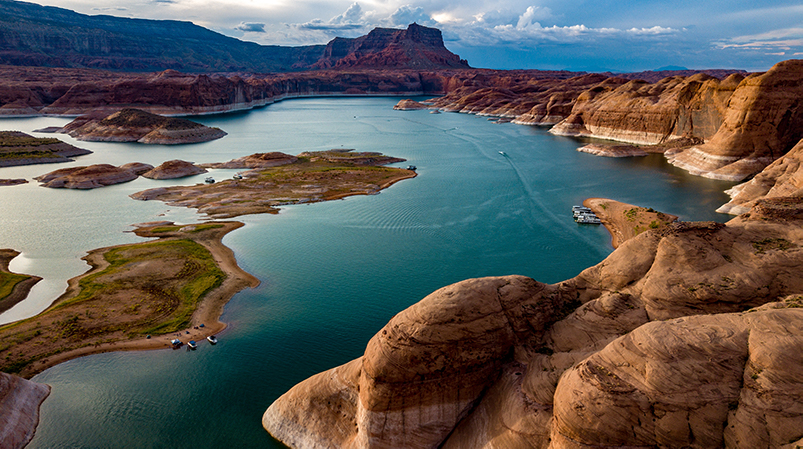July 28, 2021
Western Resource Advocates and American Rivers today announced the release of the Local Waters Alternative 2.0, a detailed study proposing solutions to meet Washington County’s current and future water needs without need for the expensive and wasteful Lake Powell Pipeline.
“As the Colorado River approaches its first-ever shortage declaration and Lake Powell approaches its lowest level on record, the West simply cannot afford the Lake Powell Pipeline,” said John Cyran, senior staff attorney at Western Resource Advocates. “The Local Waters Alternative 2.0 shows how Washington County can meet its water needs now and into the future by optimizing local supplies, managing local demand to encourage wiser water use, and using more realistic forecasts for water demand. We encourage decision makers in the Colorado River Basin, the federal government, and within Utah to explore this common-sense and affordable alternative to the unnecessary and risky Lake Powell Pipeline.”
“The Lake Powell Pipeline is an unacceptable step backwards. Massive and expensive water projects that service a tiny fraction of people in Utah don’t make sense,” said Matt Rice, director of the Colorado River Basin Program for American Rivers. “We’re called now to be honest with ourselves about the realities of water availability in the face of climate change. Instead of status quo proposals like the Lake Powell Pipeline that increase risk in the Basin for farms, rural communities, and the environment, we need solutions that reduce risk and increase resilience. The Local Waters Alternative 2.0 does exactly that.”
The Local Waters Alternative 2.0 (LWA 2.0), prepared by engineering firm WaterDM and reviewed by water supply management experts, compares available local water supply and demand management options in Utah’s Washington County with the Lake Powell Pipeline. This detailed report recommends a number of strategies to meet local water needs without the proposed pipeline, strategies that should be inserted in the federal review of the project, including:
- Optimize Virgin River supplies: Combined with common-sense conservation measures, the Virgin River can provide a more reliable, resilient, and cost-effective long-term supply option than the Lake Powell Pipeline.
- Manage water demand in Washington County: Washington County can drastically reduce water demand by pursuing key measures, such as strong development and landscape codes and improving the price Utahns—particularly the highest water users—pay for their water use.
- Use realistic demand forecasts: Including ongoing efficiency improvements for existing and new customers will cut Washington County’s current and future per capita water demand by almost half, from 286 gallons per capita per day in 2018 to a projected future water demand of 183 gallons per capita per day.
The Lake Powell Pipeline is a proposed multibillion-dollar, 140-mile pipeline project that would pump up to 86,000 acre-feet of water annually out of the already overstressed Colorado River to meet inflated future demands in Washington County in southwest Utah. The project has faced resistance since it was first proposed because of its high cost, environmental impacts, questionable benefits, and complications under the Colorado River Compact.
- As climate change continues to reduce Colorado River flows and as the river approaches its first-ever shortage, the Lake Powell Pipeline may not reliably deliver water in all years. Average flows in the Colorado River—the source of water for the pipeline—have been approximately 19% less during the 21st century compared with pre-2000 levels and are expected to continue to drop another 20-30% over the next 20 years.
- The 2020 Draft Environmental Impact Statement for the pipeline projects the immediate construction cost as exceeding $1.9 billion, excluding interest. That could be more than four times the cost of local supplies and conservation-based measures.
- The six other states sharing the Colorado River – AZ, CA, CO, NV, NM, and WY – have stated that the Lake Powell Pipeline raises significant legal issues under the Colorado River Compact.
- Washington County has unreasonably high per capita water use – more than double that of many other Western cities.
- Several proposed pipeline routes threaten to run through the Kaibab Paiute Indian Reservation or adjacent sacred areas, as well as Kanab Creek Canyon, which is of critical importance to the Kaibab Paiute tribe for cultural, historic, and religious reasons.
- By increasing withdrawals from the Colorado River, the Lake Powell Pipeline could impact the Navajo Nation’s effort to develop a similar volume of water recently approved by Congress through a settlement of the Nation’s water rights in Utah.
Resources:
- Click here to access the full LWA 2.0
- Click here for a summary of the LWA 2.0, the proposed Lake Powell Pipeline, and how the pipeline would affect the Upper Basin, Lower Basin, and Mexico
- Click here for a Story Map on the LWA 2.0 and Lake Powell Pipeline
- Click here for a fact sheet on the Lake Powell Pipeline and its challenges
Contact
Jamie Trafficanda, 720-763-3737, jamie@westernresources.org


